#the tim ferriss show
Explore tagged Tumblr posts
Text
youtube
#The Tim Ferriss Show: James Clear- Atomic Habits — Strategies for Mastering Habits Questions for Growth and Much More#Youtube
0 notes
Text
December 3rd, 2024

Studying for the GMAT day 4/150
I was listening to a podcast episode (linked below) coming home from work today, and one line really stuck with me. It essentially said to take a look at everything on your to-do list and consider
'if you only got this one task done today, would you be satisfied with the day'
Looking at my older posts so you can clearly tell how many different things I had wanted to do in a single day and how I tried to do everything and ended up doing less on those days. It makes the world just difference when I carefully consider what I set out to do in a day, and then consider everything before I actually start it. I no longer start things because it's on my to-do list but because it is something I genuinely want to accomplish. That way I go to bed feeling so much more accomplished with myself no matter how many items I crossed off a list.
What I got done today:
Re-learned factoring
Did more basic Mental Math practice to improve my speed
Focused on doing a few more word problem examples to better understand how the GMAT words questions- and how they try to trick us
Went to work and didn't fall asleep
Did tons of interview practice
The podcast in question:
#study blog#studyspo#study motivation#dark academia#daily journal#studyblr#to do list#langauge learning#coding#light academia#gmat exam#gmat preparation#studying#study aesthetic#exampreparation#get motivated#motivation#it girl self care#it girl energy#clean girl#that girl#Spotify
12 notes
·
View notes
Text
Hamilton Morris on Iboga, 5-MeO-DMT, the Power of Ritual, New Frontiers in Psychedelics, Excellent Problems to Solve, and More (#511) - The Blog of Author Tim Ferriss
“It’s a very widespread idea that if you have personal experience with a psychoactive drug, this biases you in such a way that the research that you do is not trustworthy. But this is something that we don’t evenly apply to other disciplines. No one would ever say that an ethnomusicologist is biased because they’ve listened to music or because they enjoy music themselves or that a sports commentator is biased if they have a past as an athlete. Instead, we would say that this is something that makes him an expert who is qualified to discuss the subject.”
— Hamilton Morris
4 notes
·
View notes
Text
youtube
Dr. Gabor Maté on Attachment vs. Authenticity | The Tim Ferriss Show
5 notes
·
View notes
Text
Habits
We all have habits that we want to develop, whether it's going to the gym regularly, eating healthier, or spending more time with family and friends. However, it can be challenging to break old habits and form new ones. In this blog, I want to share some tips and strategies that have helped me create better habits and stay committed to them.
Start Small
The key to forming new habits is to start small. Instead of trying to make drastic changes to your routine, focus on making small improvements each day. For example, if you want to start exercising more, start with a short 10-15 minute workout each day, and gradually increase the duration and intensity over time.
Be Consistent
Consistency is crucial when forming new habits. Try to do the activity at the same time every day to create a routine. This will help to make the habit more automatic and reduce the likelihood of forgetting or skipping it.
Set Goals
Setting goals can help to keep you motivated and on track. However, it's essential to set realistic goals that are achievable. If you set goals that are too challenging, it can lead to frustration and demotivation. Break down your larger goals into smaller, manageable tasks and celebrate the progress you make along the way.
Hold Yourself Accountable
Accountability is critical when forming new habits. One way to hold yourself accountable is to track your progress. Write down your goals and track your progress each day or week. You can use a journal or a habit tracking app to help you stay on track.
Reward Yourself
Rewarding yourself can be a powerful motivator when forming new habits. Treat yourself to something you enjoy when you reach a milestone or achieve a goal. It doesn't have to be something big or expensive, even a small reward can help to keep you motivated.
In addition to these tips, there are also several books, podcasts, and movies that can provide inspiration and guidance on creating better habits. Here are a few of my favorites:
Atomic Habits by James Clear - This book is an excellent resource for anyone looking to form new habits and break old ones. James Clear provides practical strategies for creating better habits and explains how small changes can lead to significant improvements.
The Tim Ferriss Show - This podcast features interviews with successful people from a variety of fields. Tim Ferriss is known for his expertise in productivity and habit formation, and many of his guests share their insights on creating better habits.
The Power of Habit by Charles Duhigg - This book explores the science behind habit formation and provides practical strategies for breaking bad habits and forming new ones.
Good Will Hunting - This movie is a classic and provides a great example of how someone can overcome their past and form new, positive habits. The main character, Will Hunting, is a brilliant but troubled young man who learns to confront his past and create a better future.
In conclusion, creating better habits can be challenging, but it's possible with the right strategies and mindset. Remember to start small, be consistent, set goals, hold yourself accountable, and reward yourself for your progress. By following these tips and exploring resources like books, podcasts, and movies, you can develop the habits you need to achieve your goals and live a happier, healthier life.
#habits#habit formation#self-improvement#personal development#motivation#productivity#goal-setting#consistency#accountability#rewards
6 notes
·
View notes
Photo
I’m copy/pasting the article here under a read more (it’s kinda long and I don’t want to put an extremely long post on people’s dash) for people who don’t want to click the link and/or can’t read the screen shots.
A Twitter thread has gotten some attention recently, where my former-coworker / current-best friend, Marty, recounted the day he realized just how bad, and insidious, workplace sexism could be.
After noticing that a client was treating him like crap while his email signature was accidentally set to my name, we came up with an experiment. We switched signatures for a week. Nothing changed, except that our clients read me as male and Marty as female. I had one of the easiest weeks of my professional life. He… didn’t.
But I knew long before this experiment that my life at this company was always going to be harder. I knew this on my second day.
Our boss was my age. A wealthy and privileged entrepreneur, he lived his life by the Holy Bible of Tim Ferriss’ 4 Hour Workweek. Our job was to professionally edit and rewrite customers’ resumes. Marty was still living across the country on my first day of work, with plans to move locally and work from our “office” (my bosses’ apartment) in a few weeks. I asked my boss what Marty was like. He told me, “Oh, he’s a good writer, but he tends to get over emotional about things and let that get in the way of his writing. He’s kind of a girl like that.”
I stared at him, not quite believing what he had said. To me. The only girl he had ever hired. He knew immediately that he had fucked up. He stuttered, tried to backtrack, un-backtracked, ultimately apologized and acknowledged that it was a wrong thing to say. But that didn’t matter. Message received. I put up my walls, and buckled in to try to survive at this job. This wasn’t my first time at this rodeo.
When I did meet Marty, we clicked. We bonded over being awestruck at the casual and not-so-casual moments of sexism my boss would treat me to over the few years that I worked there. Even his compliments were… fun. After a few weeks, I survived the rigorous training process and another male coworker, hired at the same time, did not. My boss complimented me and himself, saying that “I wasn’t going to consider hiring any females, but I’m glad I did. You should be proud, I had thousands of applications but yours stuck out to me, and made me decide to give hiring a girl a try.” Interesting. “Why weren’t you considering hiring any women?”
“Oh, you know. We’ve always had fun here, and I didn’t want the atmosphere to change.”
I would like the record to show that I have the filthiest mouth in the tri-state area, and one of my pasttimes has always been trying to come up with jokes off-color enough that I can actually embarrass Marty. I would also like the record to show that I developed a trucker’s mouth and bawdy sense of humor precisely because I’ve always had to act “like a man” to be found funny and be accepted in male spaces.
I kept working there and taking his money, despite the bullshit I lived with on the daily. When Marty and my boss would talk over me, I’d just get louder. When they drifted off and stopped paying attention while I was talking, I’d rewrite it in an email and force my words in front of their eyes. When my boss Pinkwashed my writing to make it sound more “feminine”, I snuck in and changed it back. And one day, I lit into Marty, telling him that he had a bad habit of talking over me and ignoring me. To his credit, and probably the reason that we are still friends, is that he listened. He took it to heart. He started using his voice to bring attention to me in meetings. I’ve seen him do the same for other women in mixed settings since. I’m grateful for that.
But I never really felt anything like despair, until our experiment ended after a week, and we decided to go to our boss so that we could tell him exactly what it was like writing while female.
He didn’t believe us. He actually said “There are a thousand reasons why the clients could have reacted differently that way. It could be the work, the performance… you have no way of knowing.” For the first time in two years, I *almost* lost my cool. I wanted to grab him by the arms and shake him, scream in his face until he heard me, stress cry and scream at the sky until the world made sense. But I did not cry. That would be breaking The Rules that had kept me alive in this company for this long.
But I will always wonder. What did my boss have to gain by refusing to believe that sexism exists? Even when the evidence is screaming at him, even when his employee who makes him an awful lot of money is telling him, even when THE BOY on staff is telling him??
I never did figure it out. Instead, I quit and started my own business writing blog posts and web copy as a freelancer. In an office of one, I can finally put my walls down.

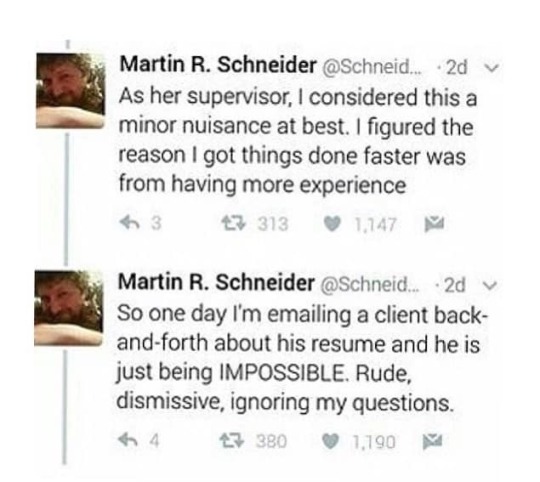
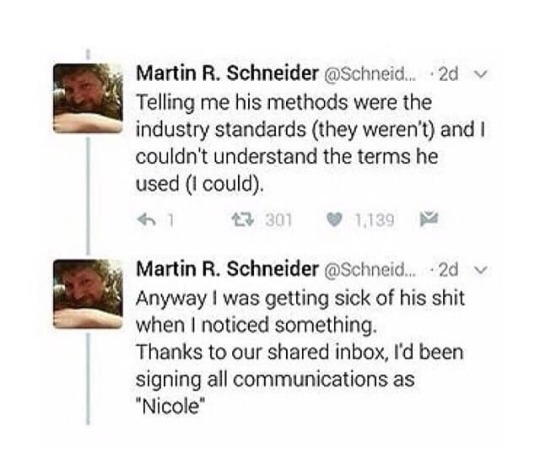
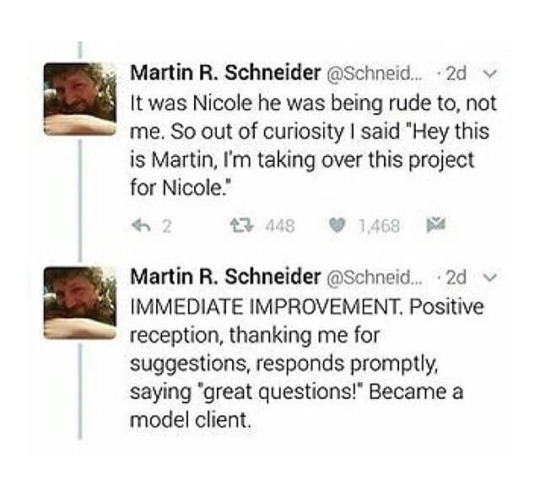
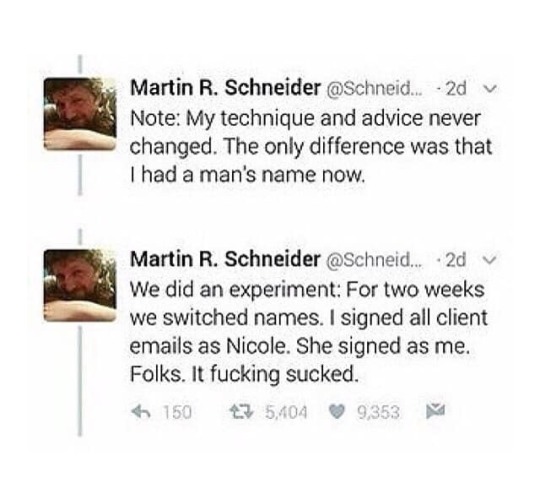
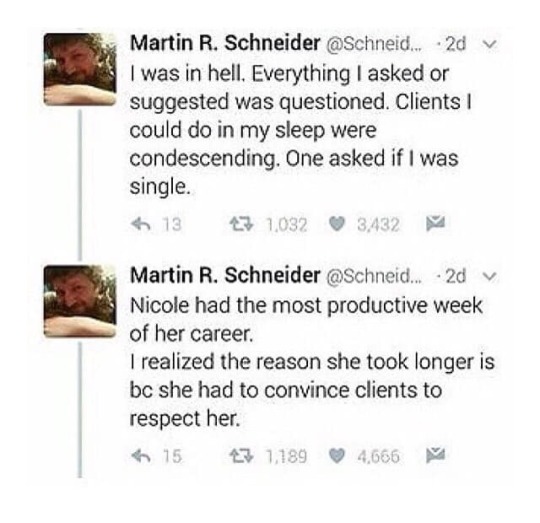
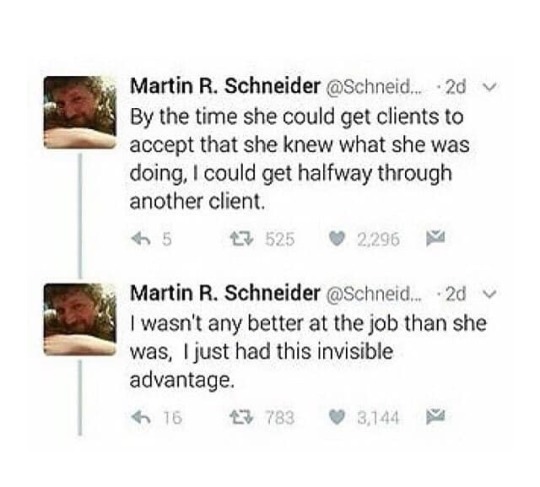
315K notes
·
View notes
Text
How I Learned to Set Healthy Boundaries and Why It’s Essential for Growth
Introduction
In a world that often moves too fast and demands too much, setting healthy boundaries isn’t just important—it’s essential for growth. For me, this lesson came through a series of overwhelming experiences that forced me to reflect, adapt, and ultimately, transform my life. Today, I want to share my journey, the challenges I faced, and the wisdom I gained along the way, in the hope that it inspires you to honor your own needs and create a life that aligns with your values.
Overwhelmed and Misunderstood: My Wake-Up Call
There was a time when my network was filled with marketers who seemed more interested in selling to me than connecting with me. They didn’t want to understand who I was—they only saw a potential sale. This constant pressure to buy, paired with unsolicited advice, left me feeling misunderstood, drained, and bitter.
In my frustration, I began lashing out online, airing my grievances in posts and videos. Looking back, I realize I was spinning out of control, trying to make sense of a world that seemed more interested in taking than giving.
The Challenges of Setting Boundaries
When I finally decided to step back and prioritize my well-being, the challenges were immediate and immense. My anxiety hit new heights as I questioned myself, wondering if I was doing something wrong. Physically, mentally, and spiritually, I felt like I was crumbling.
Yet, as I began setting boundaries, something unexpected happened: people started leaving me alone. This newfound space gave me room to breathe, but it also came with its own set of lessons. I made mistakes—cutting ties with people I later wished I hadn’t. Over time, I learned the importance of maintaining a network with intention and simplicity.
Transformation Through Boundaries
Through this process, I rediscovered myself. Setting boundaries allowed me to slow down and focus on what truly matters—my health, my passions, and my vision for life and business. My physical and mental health improved dramatically. Spiritually, I leaned on routines that kept me grounded, from meditation to essential oils, creating a sense of balance and peace that I hadn’t felt in years.
I also created a new rule for my network: I only connect with people I genuinely know and share common values with. Virtual coffee meetups became my way of ensuring authenticity, and it’s been a game-changer for building meaningful relationships.
Advice for Anyone Starting This Journey
If you’re feeling overwhelmed, I want you to know that it’s okay to slow down. Forget the notion of "massive action" if it’s not serving you. Set your own rules for how you want to show up and create.
Here’s what I’ve learned:
Follow Your Intuition: Deep down, you already know what’s right for you.
Cultivate a Spiritual Warrior Mindset: Stay calm, trust the process, and be prepared for the long haul.
Seek Upliftment: Find small rituals that bring you joy, whether it’s listening to music, taking walks, or meditating.
Turn to Resources: Books by Marie Kondo and Tim Ferriss have been invaluable for me. And don’t underestimate the power of AI as a tool for guidance and creativity.
Staying True to Yourself
At the core of setting boundaries is the practice of staying true to your values. Ask yourself: What are my values? What am I trying to create?
Once you’ve answered these questions, it becomes easier to navigate uncomfortable situations and maintain clarity. Remember, boundaries aren’t about shutting people out; they’re about making space for what matters most.
Closing
Setting boundaries has been one of the most transformative practices in my life. It’s not always easy, but it’s always worth it. By prioritizing your well-being and staying true to your values, you can create a life filled with purpose, positivity, and peace.
Stay inspired, trust the process, and never forget the power you have to create the life you want.
#personal growth#spiritual warrior#boundaries#mental health journey#self care tips#overcoming challenges#inner peace#life lessons#healing journey#self improvement#michael adams unfiltered
1 note
·
View note
Text
Is Affiliate Marketing Legit?

Affiliate marketing is where you promote another company’s product or service in exchange for a commission. When people click your link and buy the product or service, you make money.is affiliate marketing is legit
It is absolutely not a scam.
It is legal, as long as you comply with relevant laws and regulations in your country. For example, here are FTC’s guidelines.
It is ethical, as long as you disclose your relationship as an affiliate and only promote products you believe in.
Many websites earn money this way, including major ones like the New York Times, The Verge, NerdWallet, and more.
The real question is… is it worth your time?
Is affiliate marketing worth it?
There are plenty of examples of folks making fat stacks with affiliate marketing, too.
Entrepreneur Pat Flynn made around six figures in just one month in 2017.
Living Cozy, an independent affiliate website (i.e., not associated with any major brands), achieved more than $12 million in revenue.
Another independent site, Grilling Dad, generated over $25,000 per month.
MoneySmart, Asia’s NerdWallet, made $29 million in 2022.
DogFoodAdvisor, a dog food affiliate site, was acquired for $9 million.
Wirecutter (now part of the New York Times) was acquired for $30 million.
That said, it’s no get-rich-quick scheme. The process is simple, but not easy. It takes tons of investment and time before you start earning anything, and you need to know what you’re doing, especially when it comes to SEO.
Scams to look out for
Affiliate marketing itself is not a scam, but like any industry, it has its share of fraudulent activities.
Here are three major ones to look out for: is affiliate marketing is legit
Pay-to-join affiliate programs
As its name suggests, you have to pay a fee to join these affiliate programs. Don’t.
Real affiliate programs are always free to join. After all, there is no downside for the merchant, as they only pay you for each sale.
Fake gurus, courses, and training programs
In the affiliate marketing industry, fake gurus are people who sell courses on how to do affiliate marketing (or make money online) but have no real-world experience. Their main money maker is not affiliate marketing but the course they’re selling you.
As a result, these courses or training programs are typically underwhelming, generic, and likely do not deliver on their promises.
For example, years ago, before I started working as a digital marketer, I read Tim Ferriss’ 4-Hour Workweek and became interested in making money online. So, I signed up for a two-day offline workshop for a hefty sum in Singapore.
The workshop was incredibly underwhelming. Most of the participants needed help even double-clicking icons. I wasted two days on what could have easily been a three-hour workshop. For the price I paid, it was indeed a scam. True enough, later on, I found out the instructor was a well-known “fake” guru (I was green and didn’t know it back then).
I want to help you avoid my fate, so here are some red flags to spot:
Unrealistic promises — If it sounds too good to be true, it probably is.
Pressure tactics — They read Cialdini’s book once and spammed you with urgency and scarcity. Especially if they’re fake (“How does an online course run out?”)
Image over value — Rather than provide free content, their marketing and positioning are all about how luxurious their life is, how many sports cars they have, and how much money they make. Just know that their cars are usually rented and their revenue numbers doctored.
Questionable success stories — They have “social proof,” but they look suspiciously fake. Generic names or no photo IDs. And these days, AI-generated images and testimonials.
No proof of their own success — They have no case studies or sites of their own to show. If they have charts (usually up and to the right), it’s fake or stolen. Check if you can ask them for their actual sites, then plug that site into our free traffic checker to see if it’s actually generating search traffic. (If they refuse to show you their site, it could be a telltale sign.)
To find good instructors and courses, invert everything above and find instructors that:
Don’t overpromise. They should give realistic expectations.
Don’t use pressure tactics. If there’s urgency to their offer, it should be legitimate (e.g., it’s a live cohort class, so there can only be that many people).
Provide free and valuable content that proves their expertise.
Have real (and independent) success stories you can find on social media, forums, Reddit, etc.
Have proof of success (e.g., they got acquired for $X and it was reported in the news; they flipped their site, and there’s proof on a marketplace like EmpireFlippers).

Dodgy, low-quality, or scam products
It’s tempting to promote a product just because it offers high commissions. But you’ll be damaging your reputation if you end up promoting subpar, low-quality, or worse, products that don’t exist.

is affiliate marketing is legit
How to start affiliate marketing
Convinced that affiliate marketing is worth your time? Here are the basics to get you started:
1. Choose your niche
A niche is your area of focus. For example, while it’s not my idea of fun, your website could be all about vacuum cleaners.
An ideal affiliate niche has four qualities:
High-paying affiliate programs
High traffic potential
Low competition
A topic you’re interested in

to know more about us click here-nextgenfussion
1 note
·
View note
Text
Best Motivational Podcasts for Entrepreneurs: Fuel Your Hustle and Avoid the Entrepreneurial Abyss
Entrepreneurs, ditch the true-crime podcasts (unless your target market is serial entrepreneurs, which...unlikely). Building a business is a thrilling adventure, but let's face it, there will be moments when self-doubt creeps in, and the to-do list seems like Mount Everest. But fear not, fellow go-getter! Motivational podcasts are your secret weapon to combat these lulls. They'll reignite your inner fire and propel you forward on your entrepreneurial journey.

Ditch the Drama, Embrace Inspiration:
These podcasts are specifically designed to turn down the noise and dial up the motivation:
The Tim Ferriss Show: Tim Ferriss, a bestselling author and entrepreneur himself, interviews high achievers from diverse fields. Imagine a conversation with athletes, investors, and CEOs – a treasure trove of insights on productivity, business growth, and personal development.
How I Built This with Guy Raz: This NPR podcast takes a captivating storytelling approach, showcasing the origin stories of iconic companies. Hearing the struggles and triumphs of industry titans like Sara Blakely (Spanx) and Howard Schultz (Starbucks) is a powerful reminder that "if they can do it, so can I."
The $100 MBA Show: Hosted by Omar Khan, this podcast provides a practical, business school-level education tailored for entrepreneurs. Forget complex jargon; Omar breaks down concepts into easily digestible nuggets, equipping you with the knowledge to make sound decisions and navigate the entrepreneurial landscape.
The GaryVee Audio Experience: Gary Vaynerchuk, aka GaryVee, is a social media and marketing guru known for his no-nonsense advice and infectious energy. His podcast is a high-octane dose of motivation, packed with practical tips on building an online presence, content creation, and personal branding.

Bonus Tip: Sales Motivation Powerhouse Podcasts
Sometimes, you might crave a more specific boost. Here are two podcasts focused on sales motivation:
Fanatical Prospecting: Jeb Blount, a sales legend, dives deep into prospecting strategies, objection handling, and the mental mindset needed to consistently close deals.
Sales Gravy: Jeb Blount (yes, the same Jeb Blount!) co-hosts this podcast with Jim Cathcart, another sales authority. Together, they offer practical, actionable advice to help you become a sales rockstar.
Make it a Habit:
Consistency is key! Integrate these podcasts into your routine. As you absorb the knowledge and inspiration, watch your entrepreneurial spirit reignite, and your business take flight!
Ready to Supercharge Your Journey?
Everett Demorier, a motivational speaker for corporate events and sales motivational speaker, can help you cultivate a winning mindset and achieve your business goals. Explore how Everett can help you at everettdemorier.com. Don't let your business become another episode in the "Entrepreneur's Abyss" podcast – take action today!
To Know More About Everett De Morier,
Best Motivational Podcasts for Entrepreneurs
Click on the Link: https://everettdemorier.com/
Also, Call or WhatsApp to Hire for any Events at +1 (302) 300-7712
#PersonalDevelopmentMotivationalSpeakers#PowerfulEventSpeaker#TransformativeLeadershipGuides#LeadershipDevelopmentSpeaker
0 notes
Text
Personal Development: A Journey of Self-Discovery
Personal development is the process of improving oneself in all aspects of life. It is a journey of self-discovery that can lead to a more fulfilling and meaningful life.
There are many different aspects of personal development, including:
Emotional development: This involves learning to manage your emotions effectively. It also includes developing empathy, compassion, and self-awareness.
Mental development: This involves improving your cognitive abilities, such as memory, problem-solving, and critical thinking.
Physical development: This involves taking care of your physical health. It includes eating a healthy diet, getting regular exercise, and getting enough sleep.
Spiritual development: This involves finding meaning and purpose in your life. It may also include developing a connection to something larger than yourself.
Personal development is a lifelong process. There is always more to learn and grow.

Here are some tips for personal development:
Set goals: What do you want to achieve in your life? Once you know your goals, you can start taking steps to achieve them.
Learn new things: Keep your mind active by learning new things. This could involve taking classes, reading books, or traveling.
Challenge yourself: Step outside of your comfort zone and challenge yourself to try new things. This will help you to grow and develop as a person.
Surround yourself with positive people: The people you spend time with can have a big impact on your personal development. Make sure to surround yourself with positive and supportive people.
Practice self-care: It is important to take care of yourself both physically and mentally. Make sure to get enough sleep, eat healthy food, and exercise regularly.
Be patient: Personal development takes time. Don't get discouraged if you don't see results immediately. Just keep working hard and you will eventually achieve your goals.
Here are some resources that can help you with your personal development:
Books: There are many great books on personal development. Some popular titles include "The 7 Habits of Highly Effective People" by Stephen Covey and "Think and Grow Rich" by Napoleon Hill.
Online courses: There are many online courses available on personal development topics. Some popular platforms include Coursera, Udemy, and edX.
Podcasts: Podcasts are a great way to learn about personal development on the go. Some popular personal development podcasts include "The Tim Ferriss Show" and "The Marie Forleo Show."
Therapy: If you are struggling with personal development, therapy can be a helpful tool. A therapist can help you to understand yourself better and develop strategies for overcoming challenges.
Personal development is a journey that is unique to each individual. There is no one-size-fits-all approach. The most important thing is to find what works best for you and to keep moving forward.
I hope this article has been helpful. If you have any questions, please feel free to leave a comment below.
Here are some additional thoughts on personal development:
Personal development is not about being perfect. It is about becoming the best version of yourself.
Personal development is a journey, not a destination. There is always more to learn and grow.
Personal development is a process of self-discovery. It can help you to understand yourself better and find your purpose in life.
Personal development is a lifelong journey. There is always more to learn and grow.
I believe that personal development is one of the most important things that we can do. It can lead to a more fulfilling and meaningful life. I encourage you to make personal development a priority in your life.
Thank you for reading!
I would also like to add that personal development is not just about improving yourself for your own sake. It can also help you to make a positive impact on the world around you. When you are happy and fulfilled, you are more likely to be able to help others.
I believe that personal development is an essential part of being human. It is what allows us to grow and evolve as individuals. I encourage you to make personal development a priority in your life.
0 notes
Text
027 Show Notes
Episode will be released Friday, September 20, 2024. Get excited!
75 Hard
Let Shaun talk to you about Harry Potter
Great Alien piece by Joe Mayall
Ari's fitness journey really took hold when he finally encountered these resources: 1. Tim Ferriss - 2021 reset 2. Tim Ferriss - The Kettlebell Swing (supplementary read The 4 Hour Body) 3. kboges YouTube Channel
Horse Stance Video
The Benefits of High Rep Squats Video
His pull-up mastery program - it's free!
His paused rep mastery program - also free!
4. Peter Attia on protein consumption - ignore the actual title it's an annoying title lol - overall I think Peter Attia and Andrew Huberman are good resources if you want to do really really intense deep dives, but this is a good intro.
CRITERION CASEY - Bill Duke's Deep Cover, the greatest crime thriler of all time
How to keep glasses from fogging up under your mask, CASEY! lol
James Acaster's Repertoir - he becomes an undercover cop. it's delightful
Bernie Mac on Def Jam
CAN I HAVE YOUR NUMBER?
A nice little jumping off point for sex if you're having sex with someone with a vulva - to be clear, Ari doesn't necessarily agree with her statement about the responsibility of orgasm, but there's still some good advice in here.
#75 hard#self help#lol#james acaster#lift#bernie mac#def jam#grace kelly#foggy glasses#foggy aesthetic#criterion#criterion coll#lawrence fishburn#Peter Attia#andrew huberman#alex hormozi#chris williamson#modern wisdom#this is the ticket#podcast#video podcast#kboges#tim ferriss
0 notes
Text








Playing around on #canva while taking notes.. learning can be fun! Show: Invest Like the Best, Episode: Curating Curiosities with Tim Ferriss
1 note
·
View note
Text
Start a business in 48 hours
See how far you can take it
Low barrier to entry
Presell
Make a prototype
youtube
0 notes
Text
How Tim Ferriss Uses Podcasting to Grow His Business
When Tim Ferriss started his podcast, he didn’t just want to conduct interviews. He wanted to extract the tools, tactics, and routines that world-class performers use to succeed. Each episode is like a mini-documentary, filled with stories that draw listeners in. I will discuss about the power of this story telling later. But hear this story…
Did You Know?
Tim Ferriss was one of the early adopters of podcasting, as he launched his The Tim Ferriss Show in 2014. But here’s the thing: Tim didn’t start podcasting to build an empire. He did it as an experiment, more like a side project. Today, that side project has over 700 million downloads and is one of the top business podcasts in the world. But how did Tim, who started with no formal broadcasting experience, turn podcasting into a key pillar of his brand?
How Tim Ferriss played the Storytelling Game
Why This Works: People remember stories better than they remember facts and figures and their spouse’s birthday. Tim’s storytelling approach makes the content engaging and memorable. Instead of just asking a guest about their morning routine, he gets deeper into the why and how, creating a narrative that listeners can relate to and apply to their own lives.
Your Takeaway: When creating content, don’t just focus on delivering information. stitch a story around it. Whether you’re podcasting, blogging, or creating videos, storytelling can make your content more engaging.

Consistency: Tim Ferriss Built Trust Over Time
No one becomes successful overnight. In fact, when he first started, he committed to doing just six episodes. But once he realized the potential of podcasting, he made a commitment to consistency. One of the key strengths of podcasting is its ability to seamlessly integrate into people’s daily lives. Audio content can be consumed while engaging in other tasks, such as commuting, exercising, or doing household chores. As smartphones become more ubiquitous and broadband coverage expands, the convenience and accessibility of podcasts will only continue to grow.
One of the key strengths of podcasting is its ability to integrate into people’s daily lives. You can consume Audio content while engaging in other tasks, such as commuting, exercising, or doing household chores. As smartphones become more ubiquitous and broadband coverage expands, the convenience and accessibility of podcasts will only continue to grow.
“Podcasting is the future of media. It offers a unique opportunity for anyone with something to say to connect directly with an audience. It’s a medium that allows for deep conversations, authentic storytelling, and the opportunity to reach a global audience.” said Tim Ferris
Tim released episodes regularly for nearly a decade and built a loyal audience that trusts him. Consistency builds trust. When your audience knows they can count on you to deliver valuable content on a regular basis they’re likely to keep coming back. This trust is something invisible but crucial for building a brand that lasts and surely cannot be created overnight.
Your Takeaway: Look, you can’t even convert some random friend or mate to your best friend(or atleast very close friend) by some frequent meet ups right? You need to be very consistent to achieve something, specially when it is about “HUMAN BEINGS”. If you’re starting a podcast or any other form of content creation, commit to consistency. It doesn’t have to be daily or even weekly, but it should be regular enough that your audience don’t forget you and knows when to expect new content.
Tim Ferriss created had Curiosity: Asking the Right Questions
One of Tim’s strengths is his ability to ask deep. He won’t just stick to the surface-level stuff; he will dig deeper into his guests’ experiences and often uncover stories and insights that haven’t been shared elsewhere.
Why This Works: Great questions lead to great content. By asking the right questions, Tim is able to provide his listeners with unique insights and actionable advice. Firstly, This sets his podcast apart from others and secondly adds immense value to his audience.
Your Takeaway: If you’re interviewing guests or simply creating content on your own, focus on the quality of your questions. The better your questions, the more valuable your content will be.
To read the full Case Study on Tim Ferris including his podcasting Gear and more, Click Here.
0 notes
Text
0 notes